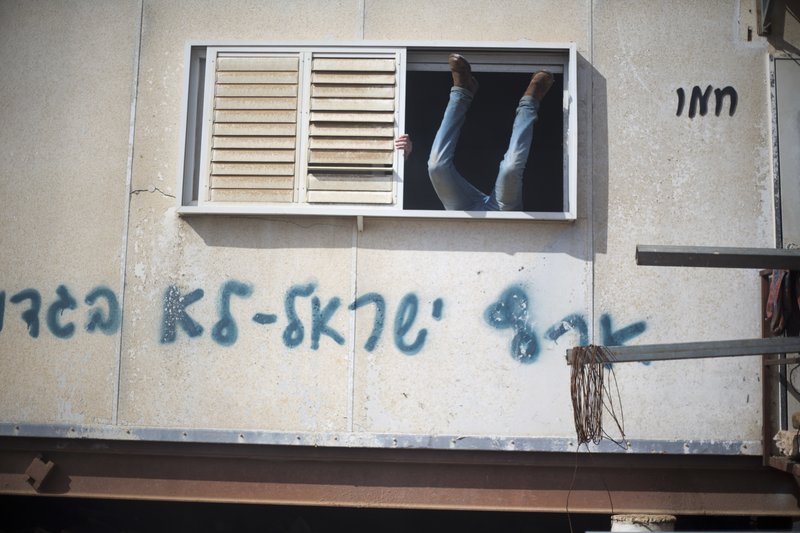JERUSALEM -- Israeli settlers on Friday shrugged off White House criticism of settlement construction, convinced that they have the sympathies of President Donald Trump. The Palestinians, still wary of Trump, warned that the settlers' hard-line stance could spell the end to a two-state solution to the conflict.
RELATED ARTICLES
http://www.arkansas…">Trump orders Iran sanctions for missile test http://www.arkansas…">Over 100,000 visas revoked, judge is told http://www.arkansas…">Bail set for Searcy teen alien as U.S. shifts prioritieshttp://www.arkansas…">Calls clog Capitol phones as Trump rolls out plans http://www.arkansas…">Trump meets with execs after Uber chief backs out http://www.arkansas…">Education pick up for final vote http://www.arkansas…">Massacre reference an error, adviser sayshttp://www.arkansas…">SEC's interim chief itching to overhaul financial rule book http://www.arkansas…">Ford, Trump detente faces test over order on refugees
Trump has been perceived as sympathetic to the settlements, an issue at the heart of the Israel-Palestinian conflict that was a frequent source of friction between Prime Minister Benjamin Netanyahu and former President Barack Obama. Israeli nationalists believe they now have an ally in the White House and have made no secret they will push for more settlements in the West Bank.
The White House said Thursday that although the administration doesn't "believe the existence of settlements is an impediment to peace, the construction of new settlements or the expansion of existing settlements beyond their current borders may not be helpful in achieving that goal."
The unexpected warning came hours after Netanyahu vowed to establish the first new West Bank settlement in over two decades "as soon as possible," promising to make up for a court-ordered demolition of an illegal settlement outpost.
[PRESIDENT TRUMP: Timeline, appointments, executive orders + guide to actions in first 100 days]
Israeli security forces dismantled the West Bank outpost of Amona earlier in the day amid clashes between police and dozens of hard-line settlers who had barricaded themselves in a synagogue.
Oded Revivi, the chief foreign envoy of the Yesha settlers' council, said his group "thanks the White House for asserting that our communities were never an impediment to peace." Using the biblical name for the West Bank, he said "nothing is more natural and morally just than Jews building in Judea."
"We look forward to working closely with our friends in the new Trump administration to build a brighter future all," he added.
The settler movement is a potent political force in Israel, and Netanyahu's narrow nationalist coalition government is dominated by settlers and their supporters.
The Palestinians claim all of the West Bank and east Jerusalem along with the Gaza Strip -- areas captured by Israel in the 1967 Mideast war -- for their state. The Palestinians and much of the international community consider all Israeli settlements illegal and view them as a hindrance to reaching a two-state solution to the conflict.
Husam Zomlot, a spokesman for Palestinian President Mahmoud Abbas, said "this statement of the White House is in the right direction, but we need more than words to protect the two-state solution, otherwise we will find nothing to talk about when President Trump" unveils his policies on the Israeli-Palestinian conflict.
"We need actions rather than words to stop the Israeli settlements expansion, which is violating the international law and killing the two-state solution," Zomlot added.
Israeli nationalists, including Netanyahu, defend the settlements on both security grounds and the historic religious ties to the territory.
They say east Jerusalem, home to key sites sacred to Jews, Muslims and Christians, is an eternal part of Israel's capital and not up for negotiation.
Today, there are some 400,000 Israelis living in West Bank settlements, in addition to roughly 200,000 Israelis in east Jerusalem, also captured in 1967 from Jordan.
In 2005, Israel withdrew its settlers and troops from Gaza.
Two years later, the coastal strip was taken over by the Islamic militant group Hamas.
Many Israelis are wary of relinquishing further territory, citing the Hamas takeover -- the Palestinian group has launched rockets at Israeli cities and fought three wars with the Jewish state.
Deputy Foreign Minister Tzipi Hotovely said Friday that if the U.S. concedes that settlements are not an obstacle to peace, then "it must be concluded that expanding construction is not a problem."
Education Minister Naftali Bennett, leader of the pro-settlement Jewish Home party, has been pushing Netanyahu to abandon the internationally backed idea of a Palestinian state and to annex the Maaleh Adumim settlement near Jerusalem. The White House statement could help Netanyahu fend off hard-line pressure to keep building and annex territory.
For decades, U.S. presidents have joined the international community in condemning the settlements. In December, Obama's administration allowed the U.N. Security Council to pass a resolution condemning the settlements as a "flagrant violation" of international law.
A day before the evacuation of the Amona outpost, Netanyahu approved 3,000 homes in West Bank settlements in addition to earlier approvals of 2,500 homes in the West Bank and 560 in east Jerusalem.
His government had unsuccessfully tried to block the evacuation of Amona. But Israel's Supreme Court rejected all appeals after determining the outpost was built illegally two decades ago on private Palestinian land.
The White House said Thursday that the administration hasn't taken an official position on settlements and that Trump looks forward to continued discussions on the issue.
He will meet with Netanyahu at the White House on Feb. 15.
Netanyahu's office said Friday that he and Trump would discuss a range of issues, including the settlements.
A Section on 02/04/2017

